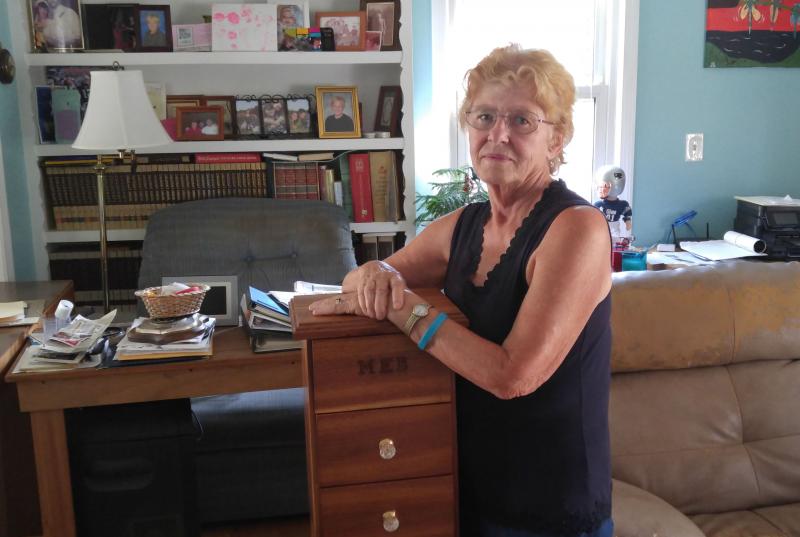Ice sheds, rhubarb, and explosive animals; growing up with Meribah Gifford
In the nearly 80 years that Dartmouth native Meribah Davis Tripp Gifford has lived here, she’s watched the town transform from a rural community to the bustling municipality it is today.
In the living room of the home she has lived in since 1958, old photo albums, family trees, and news clippings of familial accomplishments are spread out on her coffee table. She has traced her entire family background, discovering that she has five descendants who arrived in America on the Mayflower. She grew up on a farm, and still remembers her childhood babysitters: two of the famed Helfand sisters, whose family owned Helfand Farm (now a conservation area) on Chase Road.
Born in 1938, Gifford first lived in a converted ice shed on the Davis Farm property, which no longer exists, but used to be located on Slocum Road. She lived in the makeshift home, which featured high windows and heavy insulation, with her mother and father.
Life growing up on a farm in Dartmouth in the 1940s was very different than it is growing up today, according to Gifford.
“We didn’t live like people live today,” Gifford said. “We lived off of the land. We lived off of the milk that we brought in from the farm. We lived off of the garden that we grew for vegetables.”
Gifford took on many responsibilities early on in her life. By the time she turned four years old, she was already helping out around the farm. At the time, her main job was cutting rhubarb and preparing it to be sold at the market. She would bring her wares to the largest market in the area, located on Cove Road near two hardware stores, she said.
Gifford’s childhood was spent outdoors. She went rabbit hunting every Tuesday and Wednesday with her father to gather food for the family, and also worked cutting rhubarb to planting flowers and vegetables on the farm.
“I grew up like a boy,” Gifford said. “I did everything a boy would do as far as the outdoors are concerned.”
One of the more challenging jobs she encountered was preparing food for her father’s dogs. At the time, her father owned between eight and 15 dogs and several raccoons. Local farmers knew this, and would call her father over if a farm animal died so he could feed it to his dogs.
Gifford’s job seemed straightforward: she would arrive at the garage and was tasked with cutting up the dead cow or horse or other farm animal to feed to her father’s dogs. But it was not as simple as it seemed because the animals could quite literally explode.
“When an animal dies, it bloats because the gases have to go somewhere, so I used to run into the garage with a knife in my hand, stab the animal and run like heck,” Gifford said, adding that the potential explosion is a result of leaking decomposition gases.
During her school years, she was always at the forefront of Dartmouth’s educational offerings. She started off at the Russells Mills Schoolhouse, located at what is now Salt Marsh Pottery.
“When I went there, it was two classes to a room, and they had a coal stove that they had a janitor who put the coal into the stove to heat the building,” Gifford recalled.
In her high school years, she spent three and a half years attending classes at the Dartmouth Town Hall when it served as a high school. Halfway through her fourth year, she moved to a newly constructed high school, which is now the Dartmouth Middle School. She was in the very first graduating class from the new building.
When she was a teenager, Gifford enjoyed spending her free time on Round Hill. At the time, Gifford said, the beach was almost never crowded. Even when her kids were growing up, they often had the beach all to themselves.
Gifford had a job babysitting for families who lived near Round Hill, and brought her dates down to the beach. It’s where she and her to-be husband went on their dates—always under the watchful eye of her father, who worked as a security guard at the Massachusetts Institute of Technology’s former Round Hill facility, where a large radio tower once stood.
“It was kind of funny because my father was at the gate to ‘guard’ us,” Gifford said. “My father kept track of me.”
On January 30, 1957, she married her husband Hubert Gifford, Jr. They had four children and later moved into a home on a newly created development on Jason Drive off of Russells Mills Road, which was one of the first homes in the development.
Throughout the years, Gifford has held several jobs. She worked for an aviation company scheduling flights and handling bookkeeping, and later founded her own company, Sandpiper Charter Service, out of her home.
As she grew older, Gifford said she watched the Dartmouth she knew change.
“There was maybe 7,000 people in the Town of Dartmouth when I was born,” Gifford said. “It has changed drastically.”
She pointed to a loss of a rural, small-town feel as one of the main differences between the Dartmouth of her youth and today. She said in the past, she remembers driving to stores and leaving her car doors unlocked and her purse in the car, which she wouldn’t do now.
Her love for Dartmouth as it once was is what inspired her to join the Dartmouth Historical Commission. She accepted an appointment to the commission in July, and says she looks forward to helping to preserve and protect the town’s historical assets.













